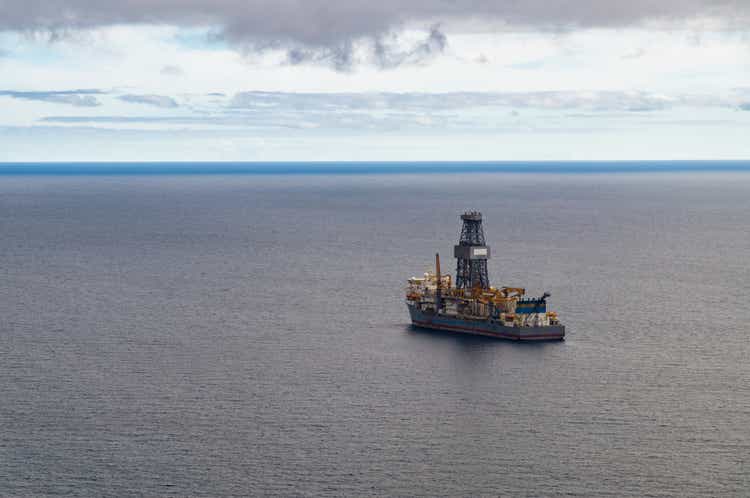
leskas/iStock via Getty Images
Note: Valaris (NYSE:VAL) has been covered by me previously, so investors should view this as an update to my earlier articles on the company.
On Monday, leading offshore driller Valaris updated market participants on recent contracting activity.
Since releasing its latest fleet status report in early May, the company has added $466 million in gross backlog excluding mobilization fees and capital reimbursements.
Clearly, the most important news was the reactivation of drillship Valaris DS-17 (formerly “Rowan Reliance“) which has been awarded a new eighteen-month contract offshore Brazil by Equinor (EQNR). The contract is expected to commence in mid-2023.
Total contract value has been stated at $327 million including an upfront payment totaling approximately $86 million for mobilization costs, a contribution towards reactivation costs and capital upgrades.
In addition, the contract terms provide for a number of integrated services including managed pressure drilling (“MPD”), remotely operated vehicles (“ROV”), casing running, slop treatment and cuttings handling. According to Equinor, the contract also includes a fuel reduction incentive.
My estimate for a “clean” dayrate would be in the range of $350,000 which is among the highest rates awarded in the region for almost a decade now.
Particularly the $86 million upfront payment is a remarkable development as for the first time, an operator has not only agreed to share into the substantial costs of reactivating a cold-stacked drillship but actually provided its contribution upfront.
That said, with the Valaris DS-17 having been cold-stacked for only two years, reactivation costs are likely to be much more moderate when compared to competitor Transocean’s (RIG) large fleet of cold-stacked drillships with many of them having been mothballed for more than five years already.
The second major development from Monday’s update was a new, four-year contract with a subsidiary of supermajor Shell (SHEL) for the modern heavy-duty jackup Valaris 115 with a total contract value of $159 million. The contract is expected to commence in April 2023.
Valaris also bagged a number of contract extensions offshore Australia and Brazil for its floater fleet and added some standard duty jackup work in the Gulf of Mexico.
Lastly, the old standard duty jackup Valaris 36 was sold to another drilling contractor with restricted use provisions for $9 million after finishing its long-term bareboat charter with ARO Drilling in May.
While adding almost $500 million in backlog within just two months is a major positive, investors should note that the company recently suffered a $428 million contract termination for the drillship Valaris DS-11 following TotalEnergies’ (TTE) decision to withdraw from the North Platte ultra-deepwater project in the US Gulf of Mexico.
While the original contract was novated from TotalEnergies to Equinor in April, the Norwegian energy giant subsequently delivered a termination notice to Valaris. Last week, Equinor transferred operatorship of the project to Shell.
That said, Valaris will receive an early termination fee that is “more than sufficient to cover expenses and commitments incurred by Valaris on the project“.
Moreover, the company was confident to secure work at improved terms for the rig in the not-too-distant future:
While we are disappointed that this contract has been terminated, the floater market and day rates have improved meaningfully since this contract was entered into in July 2021, and we expect there will be other attractive projects for a high specification drillship like VALARIS DS-11 with similar or earlier commencement dates.
Anyway, the backlog reduction resulting from the termination in conjunction with monthly revenues of approximately $125 million will likely result in Valaris reporting a reduction of the company’s total backlog from $2.5 billion to an estimated $2.3-2.4 billion next month.
Management remained constructive on the industry outlook, particularly with regards to Brazil which is expected to become a significant growth market for high-specification floaters over the next several years.
Bottom Line
Valaris continues to make good progress following its emergence from chapter 11 last year. Particularly the company’s ability to negotiate a material upfront payment for the Valaris DS-17 reactivation should be cheered by investors.
Unfortunately, with market participants increasingly concerned about a looming recesssion, oil-related stocks have taken a major hit in recent weeks.
Over the past month, Valaris’ shares are down more than 30% and with offshore drilling stocks usually trading in strong correlation with spot oil prices, additional volatility should be expected.
That said, I remain positive on the industry as a whole particularly in light of recent geopolitical events. While a potential recession will impact oil demand to some extent, vastly improved industry supply and demand dynamics coupled with greater pricing discipline should protect charter rates going forward.
Investors with the ability to stomach current volatility should consider scaling into Valaris after the recent setback.


Be the first to comment